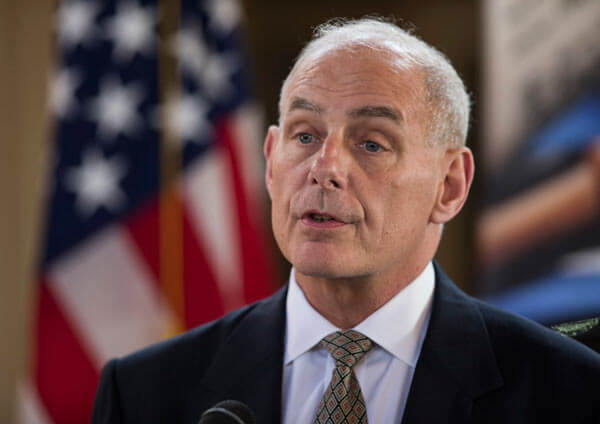Just eight days after granting limited Temporary Protected Status (TPS) to 58,000 undocumented Haitians living in the United States, a senior Trump administration official is traveling to the French-speaking Caribbean.
The US Department of Homeland Security (DHS) said on Tuesday that its Secretary, John F. Kelly, will travel to Haiti on Wednesday “where he will meet with President Jovenel Moïse and other senior government officials.”
DHS said in a very brief statement that Kelly will “discuss international cooperation and issues related to repatriation, as well as efforts to build Haiti’s maritime law enforcement capacity, and to encourage cooperation between the Dominican Republic and Haiti’s nascent border security unit.”
Kelly’s visit comes after announcing last week Monday that he was granting a six-month TPS extension to Haitians living illegally in the US. The extension, which becomes effective on Jul. 23, 2017, rans through Jan. 22, 2018.
But Kelly warned that the extension should allow Haitian TPS recipients living in the US “time to attain travel documents and make other necessary arrangements for their ultimate departure from the United States, and should also provide the Haitian government with the time it needs to prepare for the future repatriation of all current TPS recipients.”
In making the decision to grant Haitians limited TPS, rather than the usual 18 months, Kelly said conditions in Haiti had “substantially improved since the earthquake in 2010.”
He cited, among other things, the impending withdrawal of the United Nations Stabilization Mission (MINUSTAH) in Haiti after 13 years; newly elected President Moïse’s promise to rebuild the razed National Palace; and the closure of most of the tent cities.
But Haitians in the US are querying their fate after the limited TPS ends. Miami resident Evita Fremont, 48, like thousands of her compatriots, wondered what she would be going back to, according to the Miami Herald.
“If they tell you to get out, you have to get out,” she told the paper. “Haiti is my country, but it doesn’t have jobs. So, I am going back to do what?”
Fremont and others, however, take issue with DHS’ assessment, according to the Herald.
Seven years after the devastating earthquake, they say, Haiti is still recovering from the collapse of its economy, and is struggling to restore social and economic normalcy, the Herald said.
“They are doing politics. They haven’t gone to Haiti,” said Fremont, a mother of four. “If you just look at the South where I am from, there is no way anyone can say it has improved.”
Fremont has been in the United States since 2008, the Herald said.
“I can’t even think about going back,” said Fremont, who suffers from hypertension and diabetes. “All I know is that if I go back, I am not going to live long. I am a sick woman.”
An official with the International Monetary Fund (IMF), which keeps a close eye on Haiti, told the Herald that Haiti depends heavily on remittances from nationals living abroad, like Fremont.
Their dollars account for 20 percent of the income of people in Haiti annually, the unidentified official told the Herald.
“The economy has been running on fumes for the past couple of years,” said the official, noting that inflation, just 4 percent three years ago, is now at 14 percent and the public treasury is starved. “The standard of living just hasn’t gone anywhere. Haiti’s real growth is in the area of 1 percent. For a population growing rapidly, it’s a demographic, development disaster.”
Last week, the Trump administration proposed cutting the US$191 million in assistance it gave to Haiti in the 2016-2017 budget by US$33.4 million next year, the Herald said.
It said that’s on top of drastic reductions in the US contribution to the UN’s peacekeeping operations and humanitarian programs around the globe, including Haiti.
The DHS has said that Haitians, like Fremont, will now have to re-register and file for work authorization in order to remain in the US, a process that takes at least two months, and costs about US$480, the Herald said.
“For the people here, it’s very challenging because it’s very costly for them to renew things every six months,” said Randolph McGrorty, executive director of Catholic Legal Services, a non-profit organization.
“It’s clear from the tortured analysis that they want to end TPS for Haitians — not because country conditions indicate they should, but because they feel that they have given Haitians enough time,” said McGrorty said about DHS’ rationale for the six-month extension.
“Yet the community support and the reality of life in Haiti won’t allow them to do that at this time, so they kicked the can down the road,” he added.


























